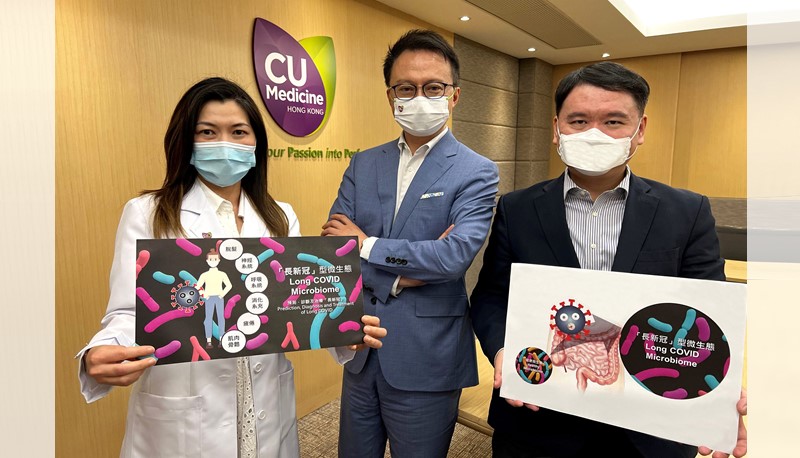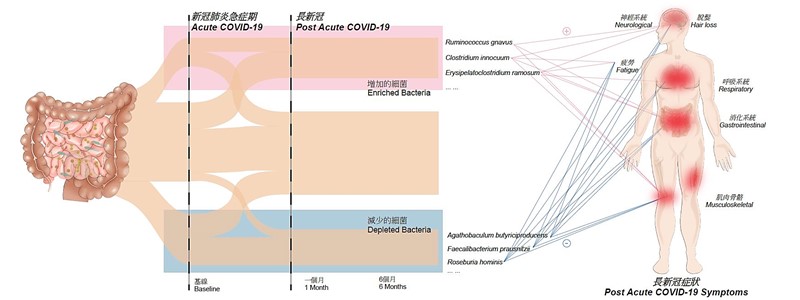
Gut microbiota: World’s first discovery to combat long COVID

Researchers of CU Medicine discover distinct gut microbial signatures for prediction, diagnosis and treatment of long COVID.
The Microbiota I-Center (MagIC) of CUHK has developed the ‘Long COVID Microbiome Risk Test’ based on the distinct gut microbiome profiles associated with post-acute COVID-19 syndrome, commonly known as ‘long COVID’. This test can be used to predict the risk of developing long COVID in patients with acute infection and to determine the likelihood of having long COVID-associated microbiome in recovered patients with persistent unexplained symptoms. This is the world’s first study to demonstrate gut microbiota as a key determinant of long COVID. The results have been published in a leading international journal, Gut.
More than 500 million people have suffered from COVID-19 globally. This study in Hong Kong found that up to 80% of recovered patients developed long COVID at six months, characterised mostly by fatigue, poor memory, difficulty in sleeping and hair loss in the weeks and months after the initial infection.
Decoding the links to specific long COVID symptoms
The study found that some 76% of patients had at least one persistent symptom six months after recovery from COVID-19. Contrary to conventional belief, factors such as age, gender, co-morbidities, severity of COVID-19, and the use of antibiotics or anti-viral drugs were not associated with the occurrence of long COVID.
Interestingly, it was found that patients with long COVID had less diverse gut microbiome, while the gut microbiome of patients without long COVID was similar to that of uninfected people. Using a machine-learning model to analyse over 1,400 stool samples, the team has identified ‘bacteria signatures’ that can predict long COVID with over 90% sensitivity and specificity. For example, a lack of certain ‘friendly’ immunity-boosting bacteria was strongly associated with persistent respiratory symptoms such as cough or shortness of breath, whereas the abundance of certain pathogens was linked to fatigue and neuropsychiatric symptoms including difficulty in sleeping, poor memory and loss of taste. It follows that the team can potentially utilise gut microbiome as a biomarker to predict, detect and treat long COVID; in particular, different bacteria signatures can account for different ‘subtypes’ of long COVID symptoms according to the organs predominantly involved.

A diagram showing the association between gut microbiome composition and long COVID.
Preventing and treating long COVID
In a pilot study of recovered COVID-19 patients who received a novel gut microbiome immunity formula (SIM01) developed by CUHK, 90% of them did not develop long COVID at six months. A large-scale randomised trial is underway to confirm the efficacy of this formula, which offers hope for the prevention and alleviation of long COVID.
Prof. Francis Chan, Dean of Medicine and Co-Director of MagIC, remarked, ‘Our findings demonstrate that individuals’ gut microbiome profiles affect their susceptibility to long COVID. Our discovery does not only for the first time offer a scientific explanation for long COVID, but also provides an effective tool for prediction, diagnosis and treatment of this global health problem.’
Prof. Siew Chien Ng, Professor and Director of MagIC, added, ‘Our study shows that microbiome-based profiling is potentially useful for risk assessment, timely diagnosis and targeted treatment of long COVID. These new findings also indicate that, in addition to hastening recovery from acute COVID-19 infection, our microbiome immunity formula (SIM01) is potentially effective in preventing long COVID.’
This study was funded by InnoHK, The Government of Hong Kong, Special Administrative Region of the People’s Republic of China.
Read more: